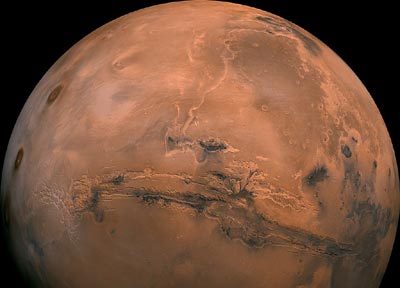The rights of humans in spaceby Michael Huang
|
| The debate over which areas should be reserved for natural (i.e. non-human) things, and which should be left for humans, extends from Earth to the solar system and beyond. |
Somewhere between the two sides, there is the belief that robots and humans should explore Mars, but that sterilization procedures be followed to protect any local species. Another centrist idea is the establishment of protected areas on Mars, similar to national parks on Earth. Humans would be free to settle Mars, but some areas would be off-limits. From this perspective, the Mars debate extends from establishing a national park over the entire planet of Mars, to creating no national parks at all.
In many respects, the Mars debate is a microcosm of a much larger dispute. The debate over which areas should be reserved for natural (i.e. non-human) things, and which should be left for humans, extends from Earth to the solar system and beyond. One side says that a national park should cover the universe (except Earth) while the other says that no parks should exist.
One of the outcomes of this debate is the proposal that extraterrestrial life has rights, a “biocentric” or “ecocentric” worldview. Alien rights (or microbe rights) are the extraterrestrial equivalent of animal rights, the philosophy behind a small but active political movement that seeks fundamental changes in the relationship between humans and animals. If life is discovered on Mars, and it is agreed that these organisms have rights, then it would shift the Mars debate to the observe-only side.
A more radical proposal is that non-living, extraterrestrial objects have rights, a “cosmocentric” worldview. “Cosmic preservationism” says that all natural objects in the universe, including planets and rocks, have rights. The nearest analogy is the preservationist philosophy of the environmental movement, the one that began the national parks system. Even if life is not found on Mars, cosmic preservationists state that we should still leave Mars alone.
The problem with the biocentric and cosmocentric approaches is that they can only apply to the extraterrestrial environment—the universe minus Earth. If they apply to Earth, then human existence would be impossible. The acts of eating and breathing would violate the rights of other living and non-living things. The central worldview on Earth is anthropocentric, the belief that humans have rights.
Anthropocentrism may be dominant on Earth, but it has been given short shrift in the extraterrestrial environment. It is evidently a symbol of everything that is wrong about the old world, and the absence of it in space is supposedly a sign of progress.
Putting anthropocentrism in space doesn’t mean the demise of biocentrism and cosmocentrism. It means that ethical questions, over Mars or any other part of the universe, should consider not only the rights of alien life and natural objects, but the rights of humans as well.
| Ethical questions, over Mars or any other part of the universe, should consider not only the rights of alien life and natural objects, but the rights of humans as well. |
Rights are most effective when they are enshrined in law. It may prove necessary to protect the rights of humans in space in this way. A modest statement, something like, “All human beings have the right to exist at any place beyond Earth,” would help defend against attempts to ban humans from Mars and other places. A more comprehensive statement would be, “Human beings beyond Earth have the same rights as human beings on Earth.” All the hard-won rights that humans have achieved on Earth—including, of course, the right to exist—would apply to people in space.
The rights of humans on Earth are self-evident, but unfortunately the same cannot be said of the rights of humans in space. In a world with an ongoing attempt to reduce and eventually eliminate human existence beyond Earth, a strong declaration of human rights would be very useful.
